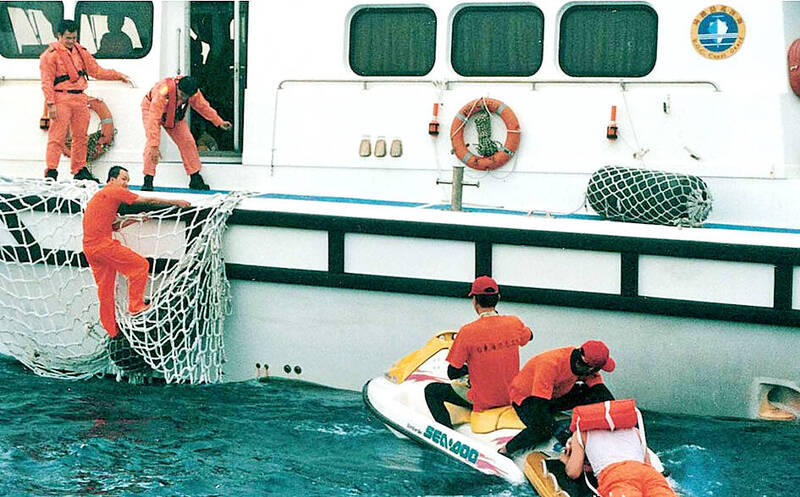《TAIPEI TIMES》 Coast guard seeks 6,000 volunteers

Coastal patrol volunteers participate in a drill in Taichung in an undated photograph. Photo courtesy of the Coast Guard Administration
EYES AT SEA: Many marine enthusiasts have expressed interest in volunteering for coastal patrols, which would help identify stowaways and illegal fishing, the CGA said
By Wu Jen-chieh and Esme Yeh / Staff reporter, with staff writer
Six thousand coastal patrol volunteers are to be recruited for 159 inspection offices to enhance the nation’s response to “gray zone” conflicts, Coast Guard Administration (CGA) sources said yesterday.
Volunteer teams would be established to increase the resilience of coastal defense systems in the wake of two unlawful entries attempted by Chinese over the past three months, Ocean Affairs Council Minister Kuan Bi-ling (管碧玲) said.
A former Chinese navy captain drove a motorboat into the Tamsui River (淡水河) in Taipei on the eve of the Dragon Boat Festival in June, while another Chinese man sailed in a rubber boat into the Houkeng River (後坑溪) in New Taipei City last week ahead of Mid-Autumn Festival, both claiming to be defecting to Taiwan.
When the CGA was founded, five maritime volunteer teams had been established across Taiwan proper and Kinmen and Lienchiang counties with 186 volunteers, a coast guard official said, speaking on condition of anonymity.
As Beijing has been sending warplanes and vessels to harass Taiwan at its borders, making the cross-strait situation volatile, the volunteers can function as “maritime scouts” and report the discovery of unidentified ships in Taiwan’s territorial waters to the authorities, they said.
The recruitment of more maritime volunteers would help compensate for radar systems’ limited capabilities in detecting unlawful entries, especially before the construction of advanced detection technology is completed, the official said, adding that many marine enthusiasts have expressed interest in volunteering for coastal patrols.
The CGA has five branches set up for northern, central, southern and eastern Taiwan, as well as Kinmen and Lienchiang counties, collectively overseeing 159 inspection offices, most of which are located at commercial ports, fishing ports or busy estuaries, they said.
In addition to the 12 ocean service stations established in 2021, the inspection offices would also be used to incorporate a 35-person coastal patrol volunteer team, the official said.
The administration said it expects to build a coastal patrol “army” of 6,000 volunteers, with a structure of squadrons, groups and corps established for management, they said.
The volunteers would assist in preventing “gray zone” conflicts and reporting illegal behavior, such as stowaways, smuggling, illegal electrofishing or blast fishing, the official said.
They would also drive a boat or join a patrol ship to help with search-and-rescue operations or marine debris removal in line with the Ocean Affairs Council’s humanitarian aid policy and sustainable ocean plans, they added.
While the CGA plans to reinforce coastal defense by recruiting more patrol volunteers, analyses of unlawful entry incidents and stowaway cases have shown that Taiwan must bolster its self-defense no matter what an intruder’s true intentions are, the official said.
In addition to infrared thermal cameras and uncrewed aircraft, an automatic identification system (AIS) should be mandatorily installed on small ships weighing less than 20 tonnes to increase their identifiability and distinguish them from foreign vessels, they said, adding that the coast guard has been discussing the issue with other agencies, including the Ministry of Agriculture and the Ministry of Transportation and Communications.
However, more communication is needed as most fishers might not be willing to install an AIS on their ships, a fisher said, speaking on condition of anonymity.
The fishing industry is highly competitive and fisheries are considered business secrets, they said, adding that a whole year’s income could be affected if they are revealed to competitors.
新聞來源:TAIPEI TIMES



















